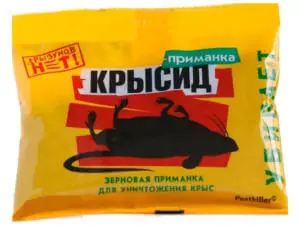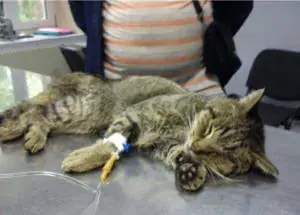Poisoning with rat poison in a cat occurs when it eats rodent bait, or if it eats a mouse that has died from the poison. And although the toxic effects of rat poison are more pronounced in relation to rats and mice, pets often become its victims.
How can you tell if your cat has suffered from rat poison? How to help your pet and should you contact a veterinarian?
The content of the articleWhat is rat poison
Products used to kill rodents (rats, mice, voles) are called rodenticides. Modern commercially available poisons for rats and mice belong to the group of zoocoumarins. Once in the animal's body, these substances interfere with blood clotting and cause extensive bleeding. According to the pharmacological classification, zoocoumarins are anticoagulants.
The main danger for pets is that signs of poisoning by rodenticides of this type appear 12 hours or more, sometimes even several days after eating the bait. In addition, such poisons have the ability to accumulate in the body and are removed from it for a very long time.
There are two groups of anticoagulant rodenticides.
- First generation: warfarin, ethylphenacin, isopropylphenacin, triphenacin - act quickly. The death of rodents occurs 1–2 days after eating the bait. These poisons are more easily removed from the body.
- Second generation: bromadiolone, brodifacoum, flocumafen. Mice die from them in 3–8 days. Anticoagulants of this group are neutralized very slowly.
First aid
If a cat is poisoned by rat poison, first aid measures are effective only immediately after eating the bait.
Here's how to proceed:
- Induce vomiting. To do this, pour 5–10 ml of a 3% solution of hydrogen peroxide diluted twice with water into the animal’s mouth. If you don’t have peroxide, you can use a pale pink solution of potassium permanganate or put a few crystals of tea soda on the root of your tongue.
- Give the cat a sorbent: Smecta, Polysorb, Enterosgel.
- Drink a laxative solution. Use saline laxatives: 2% solution of magnesium or sodium sulfate in an amount of 5 - 10 ml.
If the moment the poison entered the body went unnoticed, and poisoning was suspected based on the symptoms, then there is no need to provide first aid. The cat is immediately taken to the veterinarian.Treatment of cat poisoning with rat poison
In case of intoxication with zoocoumarins, a specific antidote is used. It is Vitamin K1 (phylloquinone, phytomenadione). It is administered subcutaneously or intravenously at a dose of 1-5 mg per kg of cat weight, depending on the severity of the condition. The course of injections will last several days, then the cat will be prescribed tablets for long-term use (up to 1 month).
Other forms of vitamin K - Vitamin K3, Vikasol - are ineffective in case of poisoning with anticoagulants.
Transfusion of donor plasma into animals gives good results. Less often, veterinarians resort to infusions of donor blood.
There is no antidote for Ratsid's poison. The toxin is removed from the cat's stomach by washing with a 1% tannin solution. Next, symptomatic treatment is carried out.
Recovery after poisoning
Treatment for rat poison poisoning can take several weeks. This will be followed by a long recovery period. The cat is kept in a warm, dry room, free from drafts.
Depending on your pet's condition, your veterinarian will recommend a diet. The cat's diet is based on the following products:
- lean boiled meat;
- liver;
- sea fish;
- boiled vegetables.
You should not give your animal food with a high fat content (fatty meat, sour cream, butter), fiber, sweets, or sausages.
If poisoning is severe, your cat may have no appetite.. You cannot force feed your pet. In this case, the veterinarian will prescribe IV drips to maintain the body.Rat poison causes serious damage to the animal's health. Even after timely treatment, a cat may develop consequences in the form of diseases of the intestines, liver, kidneys, and heart. The pet must be closely monitored for several months after recovery. At the first sign of discomfort, immediately contact a veterinarian.
Precautionary measures
It is quite difficult to prevent a cat from being poisoned by rat poison, especially if it roams freely on the street and catches mice. Still, you can take some preventive measures:
- In a private home, give preference to safe means of pest control (glue, traps).
- During the period of mass bait distributions (usually this happens in the fall after the harvest), do not let the cat go outside.
- Watch for dead rodents showing signs of rat poison exposure. Exchange information with other cat owners.
- Maintain relationships with your neighbors, ask them to report when bait is being laid out.
- Feed your cat well. Many animals bring their prey to show their owner. Try to get your cat into the habit of not eating rodents he catches.
Conclusion
A cat can become poisoned by rat poison by eating poisoned bait or rodents killed by it. The effect of most rodenticides is to reduce blood clotting, as a result of which the animal dies from hemorrhages and bleeding. The first signs of intoxication do not appear immediately - a day or more after the poison enters the body.
To treat rat poison poisoning, you must consult a veterinarian. He will inject the animal with an antidote - vitamin K1 - and prescribe medications to maintain the vital functions of the body.




